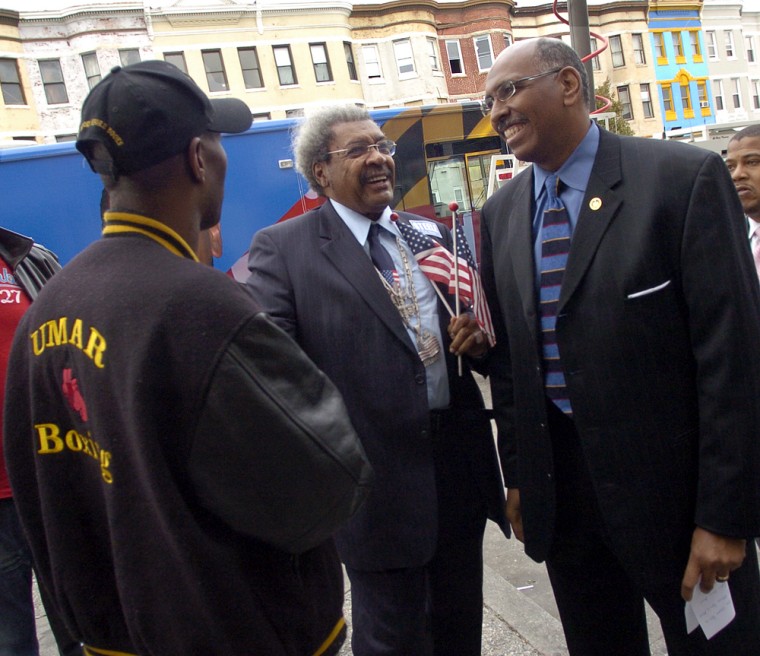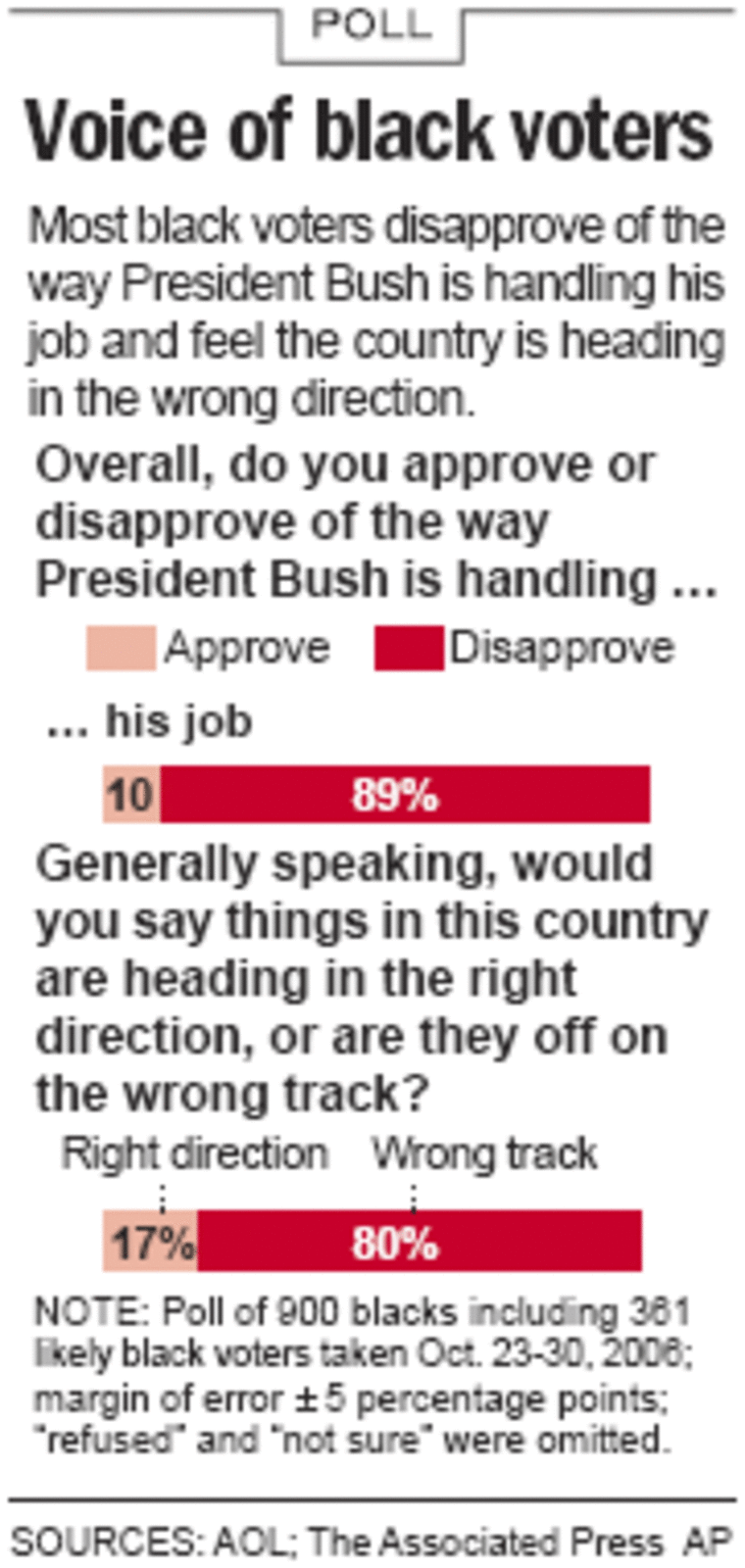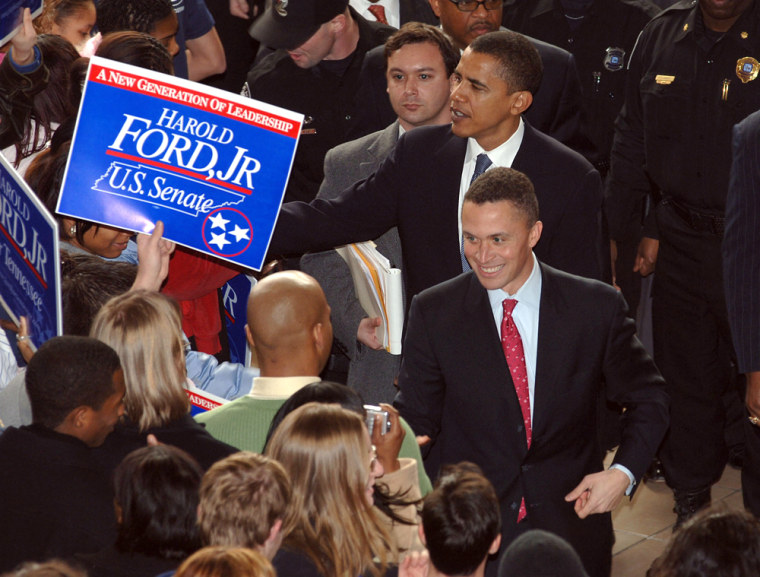So much for the Republican charm offensive toward minorities.
Black voters are far less likely to approve of the way President Bush is doing his job than voters generally and they are more likely to feel that the country is on the wrong track, disheartening news for a Republican Party that has been trying to curry favor with minority voters in recent years.
In what could be a particularly bad sign for Republicans in next week’s midterm elections, black voters also are more likely to say that the Iraq war was a mistake and that recent disclosures of scandal and corruption in Congress will be very important to their vote, according to an Associated Press-AOL Black Voices poll conducted Oct. 23 through Monday.
Black voters have historically voted Democratic, and their votes are critical to Democratic hopes to win tight Senate contests in Tennessee, Missouri and Virginia.
Unhappiness among black voters is reflected by L.C. Washington, a 41-year-old Democratic graduate student from Montgomery, Ala., who says Bush is “the worst president in history,” not to mention “the dumbest president I’ve ever seen — he’s the devil.” Washington lays blame for a laundry list of ills at the Republican Party’s doorstep.
“Republicans are trying to win over black voters,” says Washington, but “not doing a good job. Doing a poor job — the war, gas prices, job losses and the layoffs.”
Even among black Republicans, there clearly still is work for the GOP to do.
“I don’t think Republicans are doing any kind of reaching out to African-Americans,” said 71-year-old L.D. Harper of Springfield Gardens, N.Y., who’s been a Republican since he was 18.
Misgivings with Democrats too
While black voters say Republicans have done a poor job of representing their interests, they also have misgivings about the Democratic Party. Almost half of black voters said the Democratic Party takes their vote for granted; about a third said the party has done a poor job of representing their interests.

About a fourth of blacks said they weren’t confident their votes would be counted accurately.
On the issues, black voters were most likely to rate the economy and health care as extremely or very important to them personally.
The AP-AOL Black Voices telephone poll of 900 black adults, 361 of whom are likely voters, was conducted by Ipsos.
The margin of error for the full sample is plus or minus 3.5 percentage points, 5 percentage points for the black likely voters.
The overall likely voter results are from an AP-AOL poll released last week.
About nine of 10 black voters have gone for the Democrats in recent elections.
The Katrina factor
Republicans, particularly party chairman Ken Mehlman, have tried to reach out to minority voters in recent years. Bush’s draw on the black vote inched up to a still-anemic 11 percent in 2004. But since then the party has taken a hit because of widespread dissatisfaction with how the Bush administration responded to Hurricane Katrina last year.
Only 38 percent of African Americans are confident the federal government would help them in a major disaster, according to the AP-AOL poll.
And while the Republican Party has strongly pushed the candidacies of black Republicans in the coming elections, the survey offers little hope that black GOP candidates hold special appeal for minority voters. More than eight in 10 black likely voters say the race of the candidate makes no difference to them.
“It just depends on their platform,” said Kassandra Williamson-Moore, a black Democrat from Indianapolis. “You can’t just vote strictly by race.”
Prominent black candidates this year include Republican gubernatorial hopefuls Kenneth Blackwell in Ohio and Lynn Swann in Pennsylvania, GOP Senate candidate Michael Steele in Maryland, and Democratic Senate candidate Harold Ford Jr., in Tennessee. Republicans Steele, Blackwell and Swann are behind in the polls; Democrat Ford is running about even with his opponent.
Blacks are disproportionately unhappy with Bush; 89 percent of likely voters disapprove, compared with 61 percent of all likely voters.
But blacks’ approval ratings for Congress — disapproval ratings, actually — are roughly similar to those for all likely voters. Some 83 percent of likely black voters disapprove of the way Congress is doing its job, compared with 75 percent of all likely voters.
‘One step forward, two steps back’
David Bositis, of the Washington-based Joint Center for Political and Economic Studies, said there’s little variation in congressional approval numbers by race because Congress is so widely viewed as being “in the trash.”

Overall, Bositis said, the Republican courtship of black voters sometimes looks like a case of “one step forward, two steps back.”
“They’re never going to succeed in attracting more African-American support until the party has some level of catastrophic failure and then decides to go back to the drawing board,” he said.
Curtis Gans, director of American University’s Center for the Study of the American Electorate, said voter turnout among blacks tends to be lower than among adults in general, but in 2004 they, like Americans overall, turned out in higher numbers.
He said voter discontent could boost turnout similarly this time, adding that: “The group that is the most uniformly anti-Republican at this time is African-Americans.”
Two-thirds of black registered voters say they are following news about the campaign, compared with 71 percent of all registered voters doing likewise.
